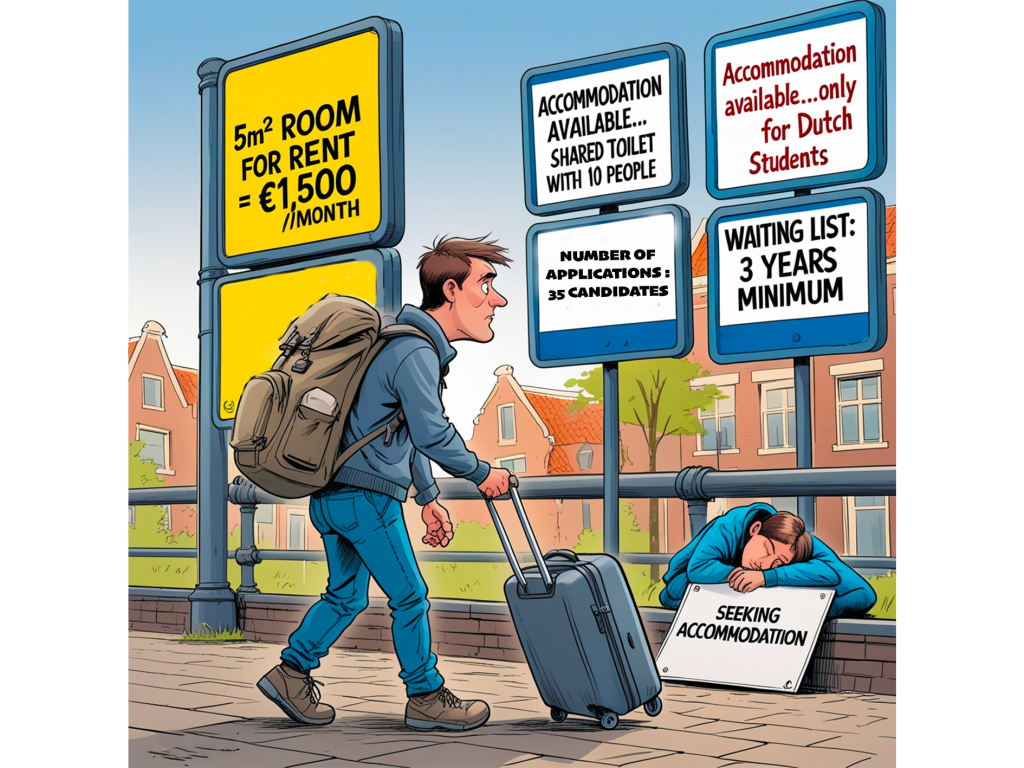The housing shortage in the Netherlands is one of the major issues that the country has been facing for several years according to an article in the NL Times. Balakrishnan Rajagopal, UN Special Rapporteur on adequate housing, has called on Dutch politicians to stop stirring up hatred towards foreigners by holding immigrants responsible for the housing crisis in the Netherlands. According to the UN rapporteur, this issue is rather due to ineffective public policies. This crisis affects many sectors of society, including students, and indeed international students.

The Netherlands, one of the most densely populated countries in Europe with 17.8 million inhabitants, is facing an alarming housing shortage. According to a recent study quoted by Rajagopal, there is a shortfall of around 390,000 homes across the country. The UN rapporteur stressed that this crisis is essentially linked to a government policy that has favoure liberalisation of the property market to the detriment of public intervention in housing construction. “Access to decent housing is a human right, and this right is seriously compromised in the Netherlands”, he told a press conference in The Hague druing his visit to the Netherlands, from 11 to 21 December 2023.
Growing pressure from foreign students
While the shortage is affecting the entire Dutch population, it is having a particularly severe impact on students, especially foreign students. Dutch universities, internationally renowned for the quality of their English-language programmes, are attracting increasing numbers of international students every year. Between 2016 and 2021, the foreign student population increased by 51%, and now accounts for a third of all students enrolled in the country’s higher education institutions according to the government administration Campus France. This increase has exacerbated the pressure on the already saturated student accommodation market.
Foreign students arriving in the Netherlands for work placements or short periods are at a particular disadvantage. According to a survey we conducted among 20 international students, 47.6% say they have had difficulty finding accommodation, 57.1% find property prices too expensive and 28.6% are dissatisfied with their current accommodation.
Leila* (name changed), a student from France, came in January in the hope of finding accommodation, but soon discovered that estate agents do not generally rent for short periods. After a visit where she had to fight off around twenty applicants for a room, she finally found an accomodation thanks to the SSH (Student Housing) initiative. The International Office of Windesheim explains having an agreement with SSH student housing in Zwolle for a fixed number of rooms. “It has been challenging in the past to place all exchange students, that is why we cannot guarantee student housing.” explains the International Office. “Since this study year we have extra student housing on campus, although the rooms aren’t available at the moment”. Leila* is currently waiting to get her own room on campus. In the meantime, she has been placed in a temporary accommodation. “I was lucky to find a room even though it is 5m2, but the place I am staying in at this moment doesn’t have Internet access”, she explains. Another international student, Benoit from France, also struggled with finding a room. “When I logged into the SSH website all the accommodations were already booked. I also got a temporary room but I found it one week before leaving France. It was really stressful. My room is really far away from the university and the house is really dirty” he sighs. “But what bothers me most is that I have no idea when my new room will be available.” he continues. Some other students also complain about dirtiness, stuff not working correctly (electricity, internet access …) and old buildings.
If some students found an accommodation through SSH, University halls of residence are also far from being a viable solution for many students. For example, the University of Delft is faced with a waiting list for rooms of up to 38 months, which is totally incompatible with the length of a standard university course.
Fierce competition and prohibitive prices
Foreign students are facing fierce competition for the scarce accommodation available. With demand far outstripping supply, rents have risen sharply. In Amsterdam, the price per square metre rose by 70% between 2010 and 2020, making student accommodation unaffordable for a large proportion of students, even those with relatively comfortable financial means.
“It’s just impossible to rent a flat here on your own, it’s too expensive and there’s too much competition,” regrets Anna, a French student doing her internship in Rotterdam. During her search, she sent over 120 emails, received around 10 replies and met 3 or 4 potential landlords. “The prices are so high that many students, like my boyfriend, have to deal with very small rooms, sometimes shared with other people”, she says. Her friend took more than three months to find a 7 m² room in a house shared with 16 other flatmates.
Discrimination, an additional obstacle
Another phenomenon that complicates the search for accommodation for foreign students is discrimination. On Facebook, where many property advertisements are circulating, two-thirds of the offers exclude international students, according to Dave Bekkering, from the anti-discrimination platform Discriminatie.nl. Because of the strong competition, some landlords systematically favour Dutch applicants, sometimes even refusing to consider renting to foreign students. The International Office of Windesheim told us “This might be because they are looking for flatmates staying longer than 5 months only – that is the feedback we mostly get from private housing.” Another reason could be the language barrier as well.
As part of the 2021-2025 coalition agreement, the Dutch government is taking ambitious measures to tackle the housing crisis, in particular by increasing the construction of affordable and temporary accommodation. However, despite these efforts, if further action is not taken soon, the Netherlands’ reputation for academic excellence risks being tarnished by a far more brutal reality: that of a generation of students forced to choose between precarious accommodation or giving up their studies.




